UACES 53rd Annual Conference in Belfast
UACES 53rd Annual Conference took place in Belfast. Almost 350 colleagues of the European Studies community and other academics in the field of contemporary European studies came together at Queen's University Belfast (QUB). Over 3 days, from 3-6 September 2023 and with a virtual day held on 11 September, participants discussed topics on EU Identity, EU Law, Economics and Trade, Sustainability and Climate Change, Territorial Politics, Security and many more across 113 panels.
Plenary 1: 50 Years of EU Enlargement
1973 saw the then European Communities enlarge for the first time and increase its size from six to nine member states. Successive Mediterranean enlargements, an EFTA enlargement, enlargement eastwards and into the Western Balkans have since followed. And with eight candidate countries and two further applicants, the questions of whether, when, how and to include whom the EU should enlarge remain as salient as ever. The plenary provides an opportunity to reflect on 50 years of EU enlargement since the first accessions in 1973. Panellists will consider the key drivers of enlargement and how these have changed over time, the contribution of academic study to understanding of the dynamics of the process, the significance of enlargement for the development of the EU, and the current state of the EU debate on enlargement and the prospects for further expansion of the EU in the light of current and potential membership applications.
Speakers:
Prof John O’Brennan (Maynooth University)
Dr Barbara Lippert (SWP, Berlin)
Prof Helene Sjursen (ARENA, Oslo)
Dr Koen Slootmaeckers (City University, London)
chaired by Prof David Phinnemore (Queen’s University Belfast)
With a welcome by Prof Simon Usherwood, UACES Chair (Open University).
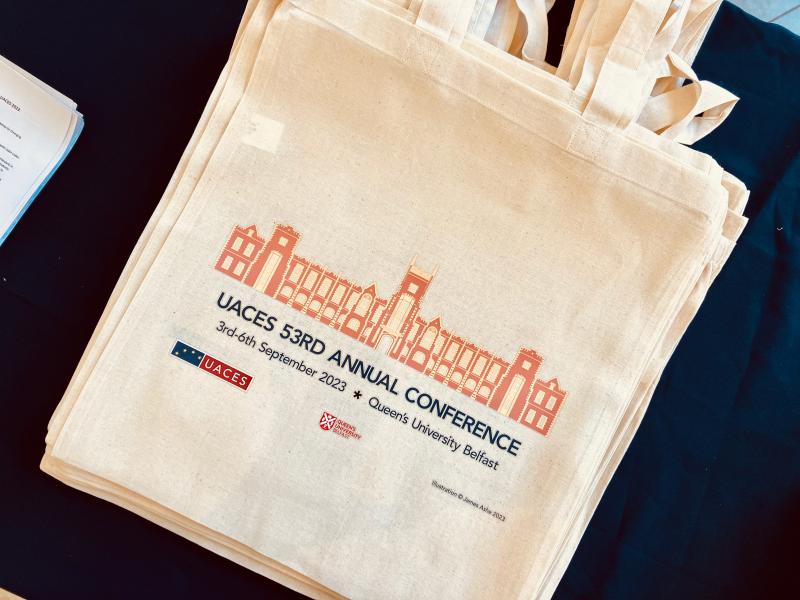
Conference Bags 2023
This year's bags showed the iconic Lanyon Building. The graphic was created by Belfast-based visual artist James Ashe.
All photos taken by Melina Dieckgräber.
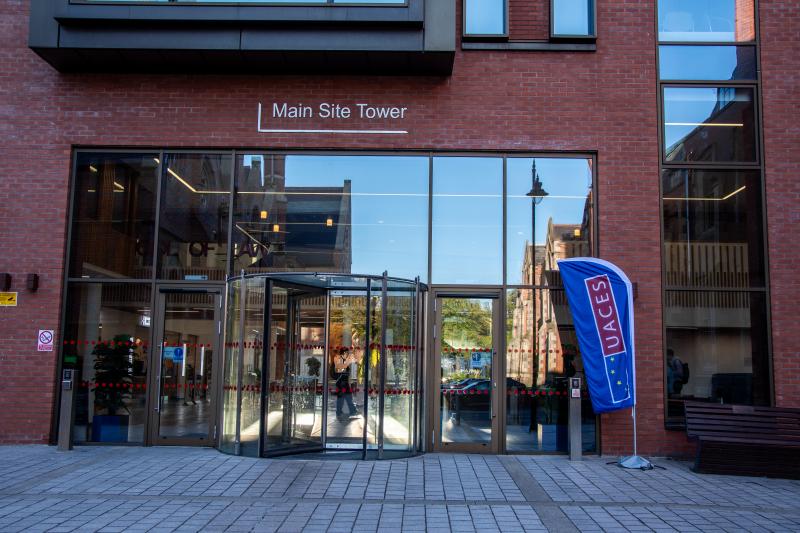
Main Site Tower
The main conference took place in the Main Site Tower which is also home of the School of Law.
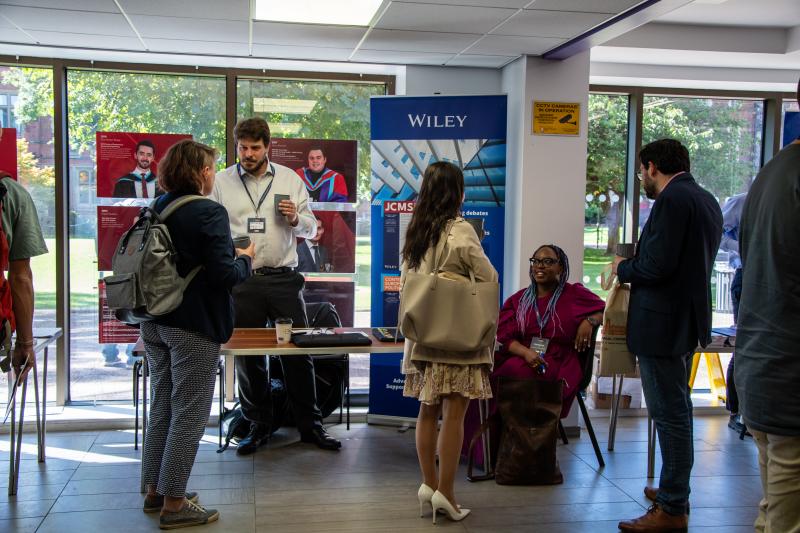
Meet Journal Editors
UACES has 2 journals, JCMS and CEP. At our conferences, participants get the chance to directly speak to them to find out about submission guidelines and interesting topics for the journal.
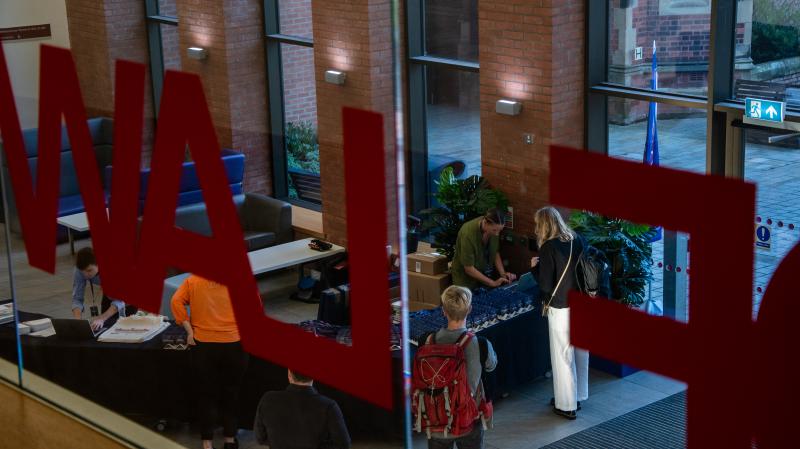
Reception Desk
Participants find us first thing when they arrived to collect their badge and other conference goodies.
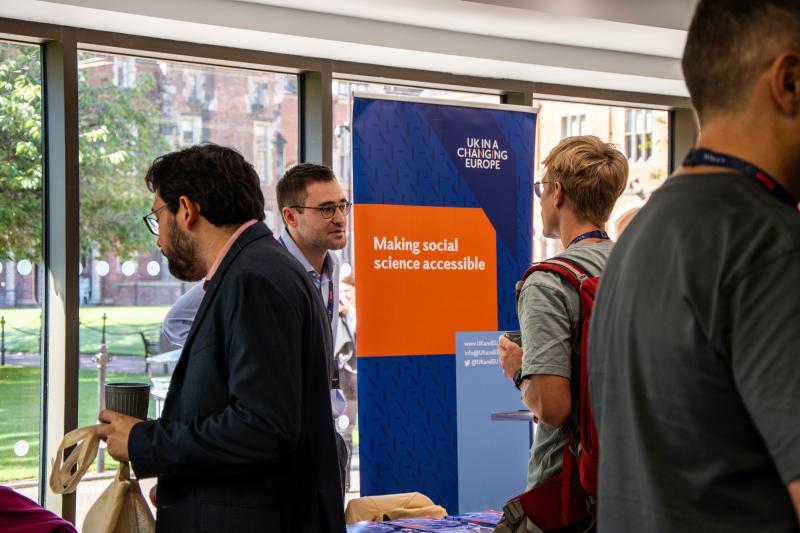
UK in a Changing Europe
The think tank UK in a Changing Europe partnered with UACES. They had their own table where participants could swing by and connect.
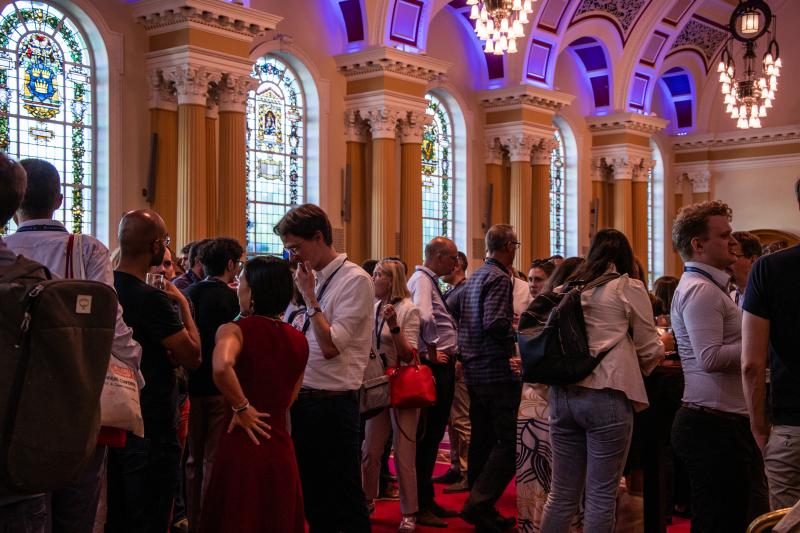
Drinks Reception in Belfast City Hall
We had the honour to welcome our conference participants to Belfast City Hall for our drinks reception.
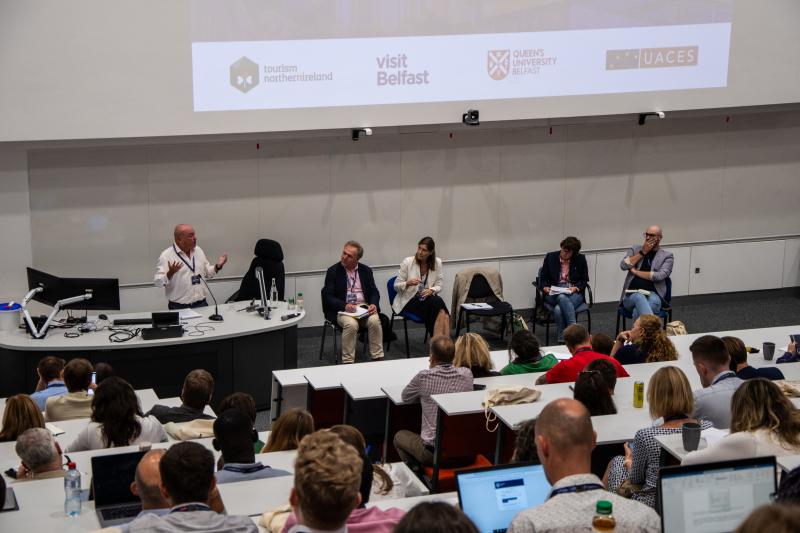
50 Years of EU Enlargement
The first plenary was kicked off by Prof John O’Brennan (Maynooth University), Dr Barbara Lippert (SWP, Berlin), Prof Helene Sjursen (ARENA, Oslo), Dr Koen Slootmaeckers (City University, London), and Prof David Phinnemore (Queen’s University Belfast) as Chair.
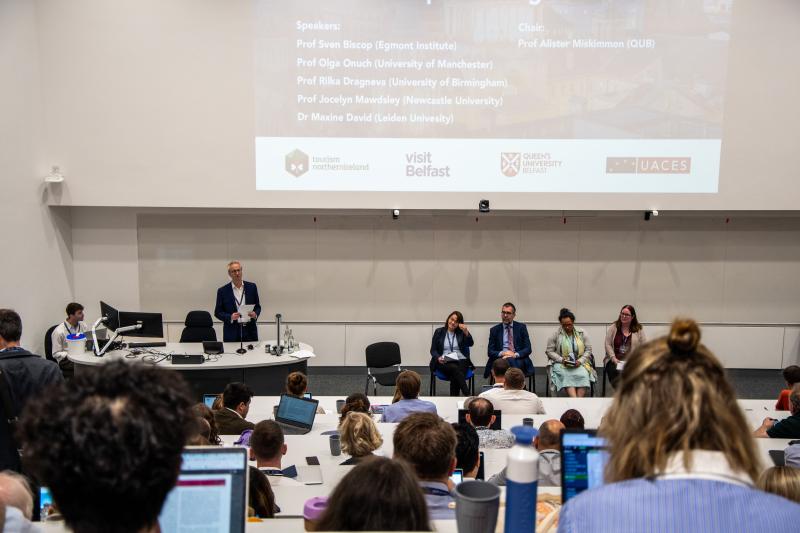
Ukraine and the future of European Integration
The second plenary took place on Tuesday 5 September 2023 with speakers Prof Sven Biscop (Egmont Institute), Prof Olga Onuch (University of Manchester) who attended online, Prof Rilka Dragneva (University of Birmingham), Prof Jocelyn Mawdsley (Newcastle University), Dr Maxine David (Leiden University). Prof Alister Miskimmon (Queen's University Belfast) chaired the plenary
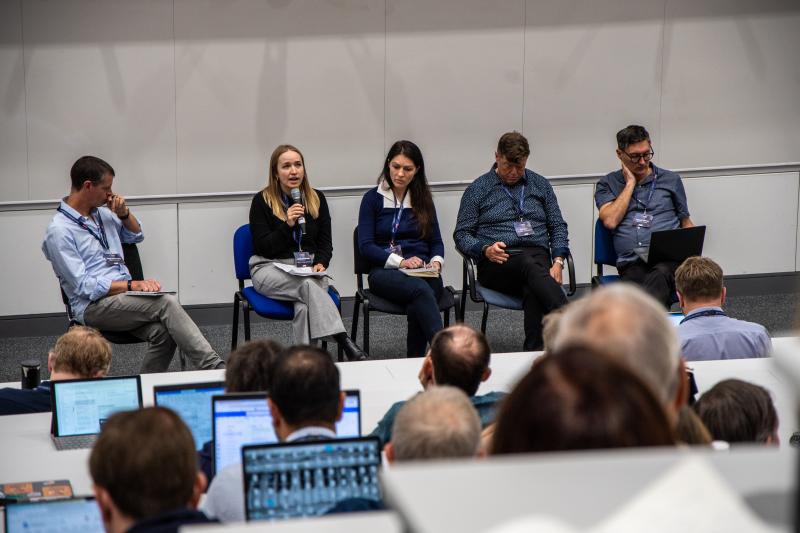
The European Political Community as a New Path for European Cooperation
Speakers Dr Cleo Davies, Prof Ben Tonra, Jannike Wachowiak, Prof Richard Whitman and Chair Prof Simon Usherwood participated in plenary 3: The European Political Community as a new path for European cooperation. This panel was sponsored by UK in a Changing Europe.
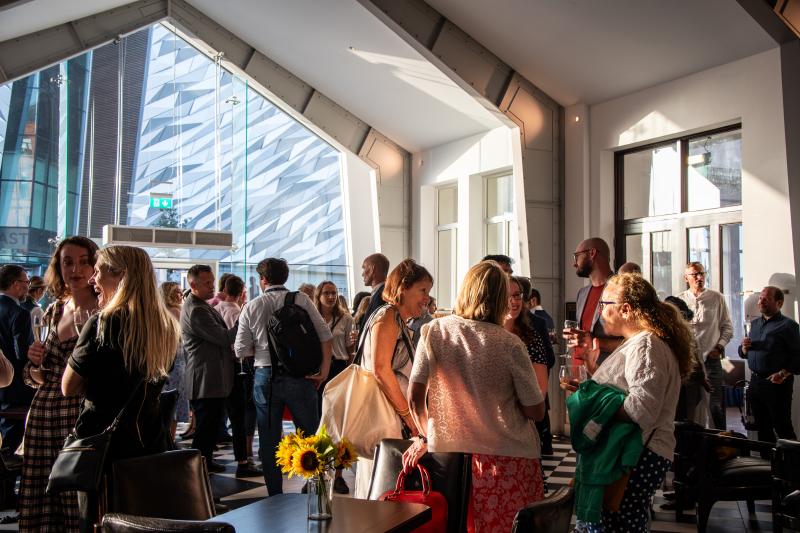
Conference Dinner
We had our conference dinner at the iconic Titanic Hotel Belfast. A drinks reception was followed by a 3-course meal and our awards ceremony.
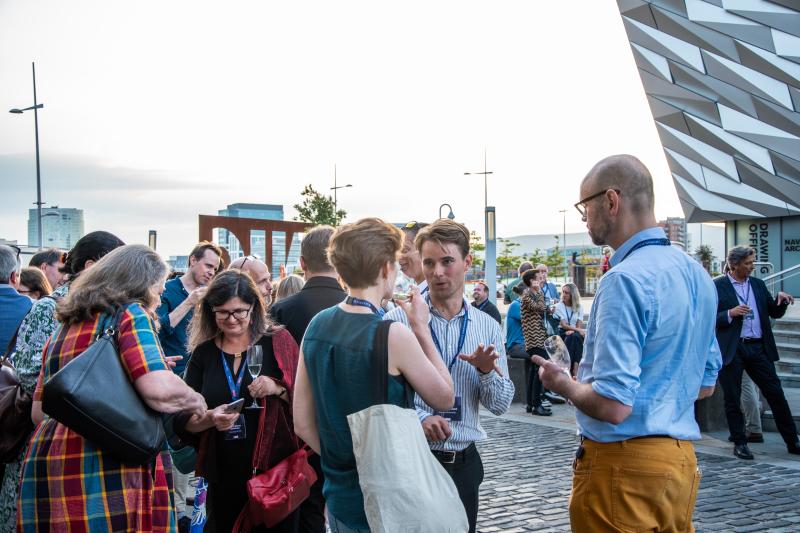
Conference Dinner
In front of the Titanic Museum, people gathered around before the dinner.
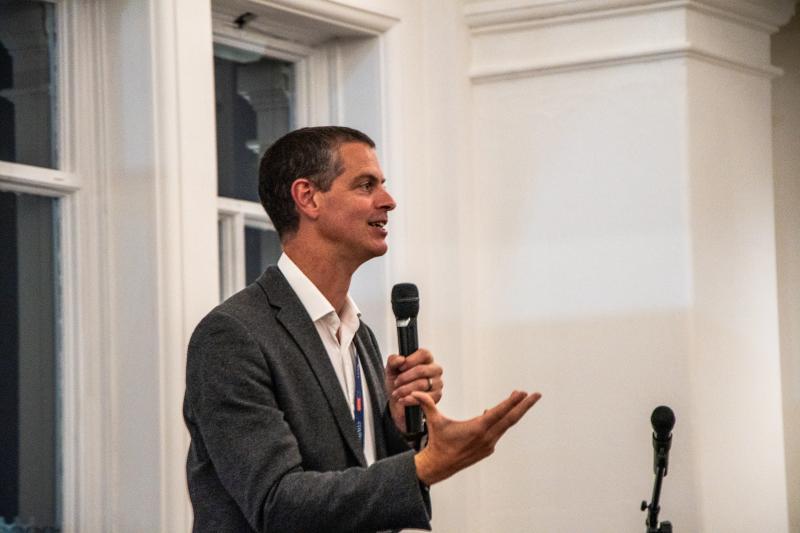
Welcome by UACES Chair
Prof Simon Usherwood welcomed all dinner guests and had the pleasure to award the Lifetime Achievement Award, the Best Book and Best PhD Thesis Prize. He also thanked the organisers, past committee members and welcomed new members.
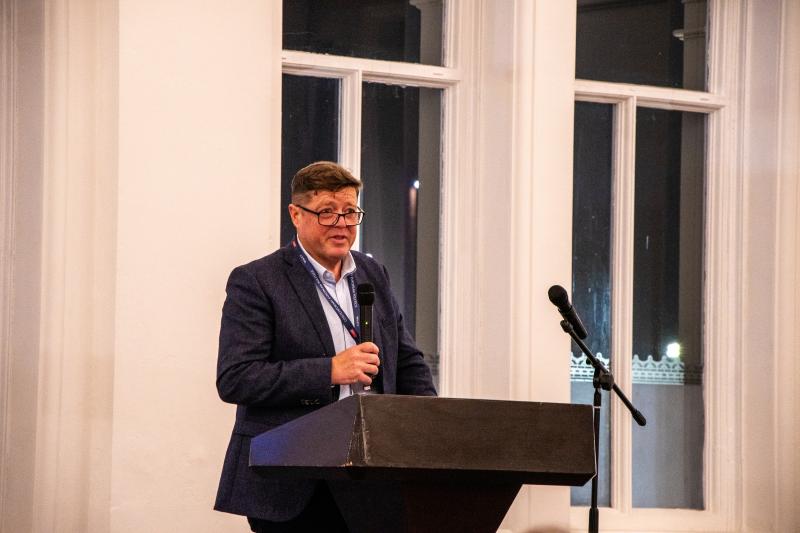
Lifetime Achievement Award
Prof Ben Tonra gave an acceptance speech in front of the dinner guests. He won the UACES Lifetime Achievement Award 2023.
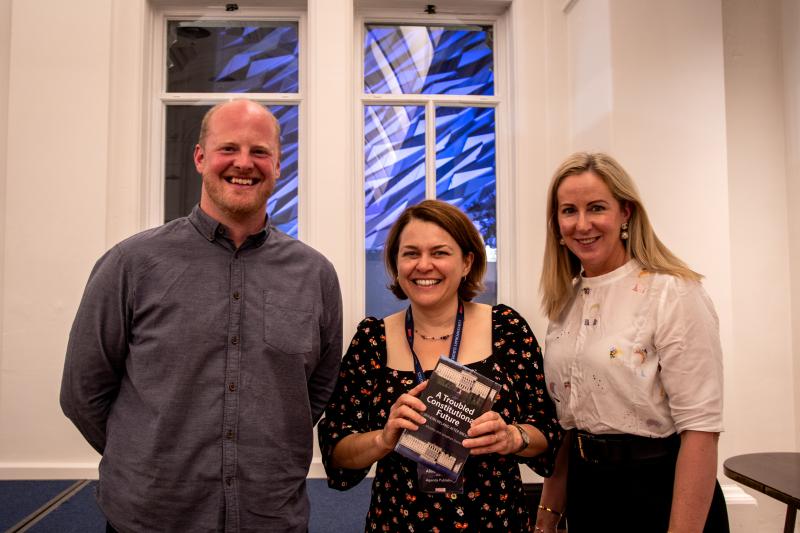
Best Book Prize
We awarded the Best Book Prize at the dinner. Dr Mary C. Murphy and Dr Jonathan Evershed won the prize with their book: A Troubled Constitutional Future.
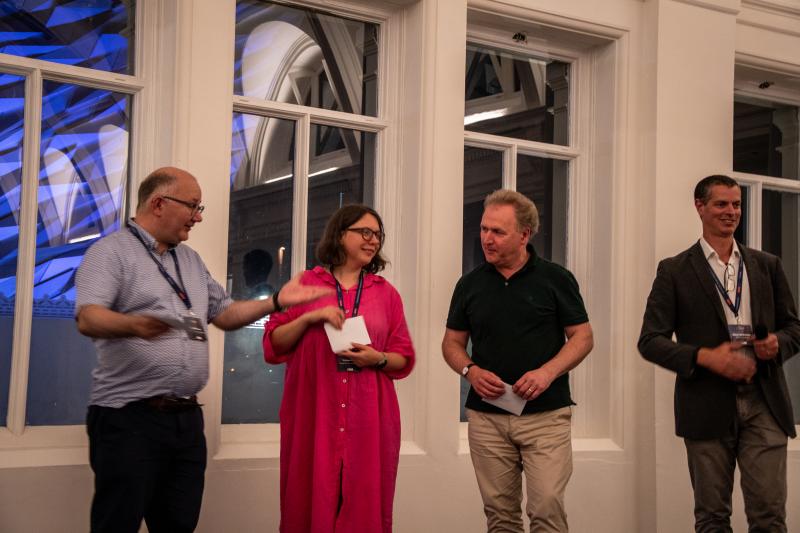
Conference Organisers at Queen's University Belfast
We thank our organisers Prof Lee McGowan, Dr Viviane Gravey and Prof David Phinnemore (from left) for all their hard work making it such a great conference experience.
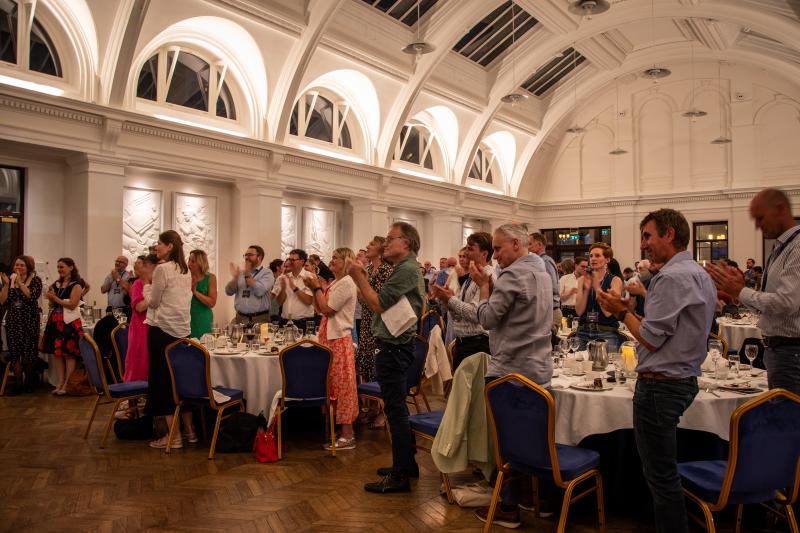
Congratulations.
The whole European Studies Community congratulates this year's winners of the Lifetime Achievement Award, the Best Book and Best PhD Thesis Prize.
Plenary 2: Ukraine and the Future of European Integration
The ongoing war in Ukraine has raised profound questions about Ukraine’s future relationships with its neighbours and its position within the European integration processes. It further questions the roles and capacities of the EU and European organisations in responding to the conflict. This plenary provides an opportunity to consider the implications of the conflict for European integration and the challenges it poses for not just the EU but also the likes of the Council of Europe, NATO and the Organisation for Security for Security and Cooperation in Europe, and for Ukraine’s changing engagement with these organisations. Panellists will not only consider key challenges and assess responses to date, but also reflect on the extent to which these organisations have the capacity to respond effectively in the medium to longer term and what the lasting impact of the conflict on them and their activities, and the changing place of Ukraine in the multiple European integration processes.
Chair: Prof Alister Miskimmon (QUB)
Speakers:
Prof Sven Biscop (Egmont Institute)
Dr Maxine David (Leiden Univesity)
Prof Rilka Dragneva (University of Birmingham)
Prof Jocelyn Mawdsley (Newcastle University)
Prof Olga Onuch (University of Manchester)
Plenary 3: The European Political Community as a new path for European cooperation
The emergence of the European Political Community in 2022 as a venue for pan-European debate and as an expression of solidarity against the Russian invasion of Ukraine has opened up debate about whether it can offer a meaningful contribution to future European governance. In this roundtable discussion, organised with the support of UK in a Changing Europe, there will be reflection on whether and how the EPC might develop, both an autonomous body and as an accompaniment to existing forums.
Speakers:
Cleo Davies (UEA)
Ben Tonra (UCD)
Jannike Wachowiak (UKiCE)
Richard Whitman (Kent)
Chaired by Simon Usherwood (Open University)

